
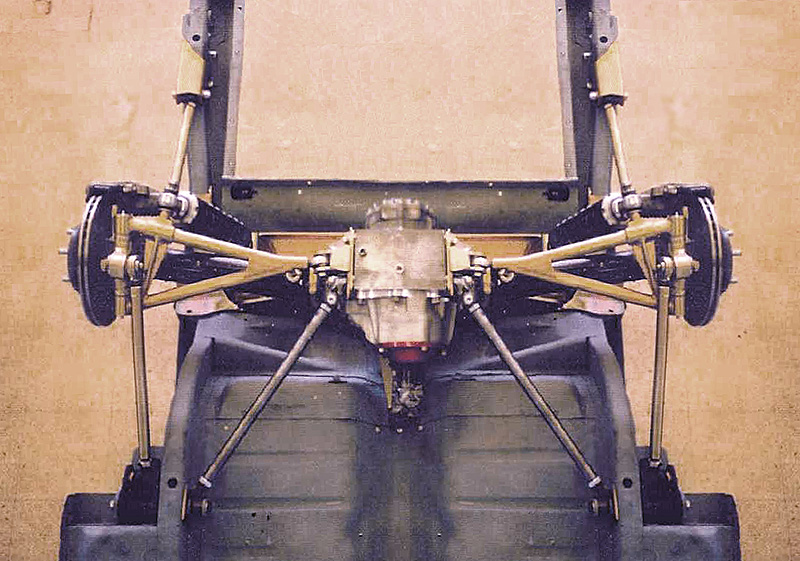
 |
 |
 |
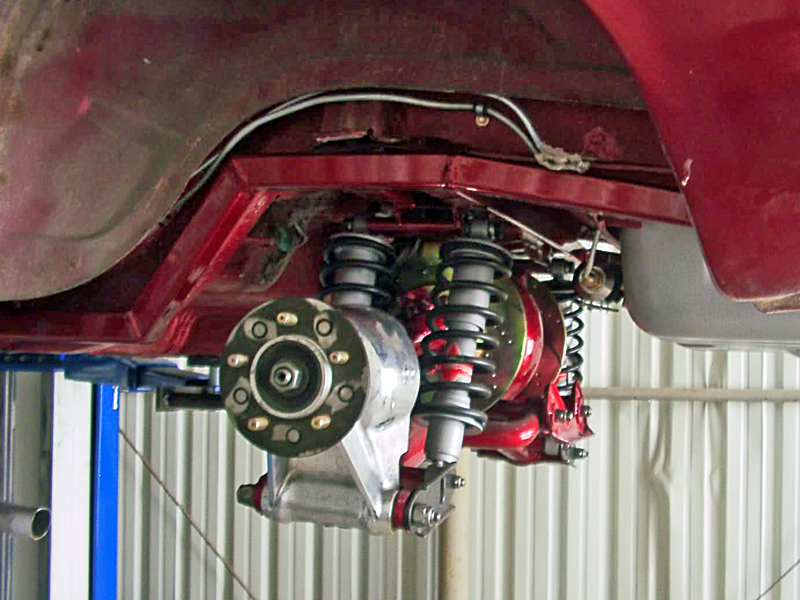 |
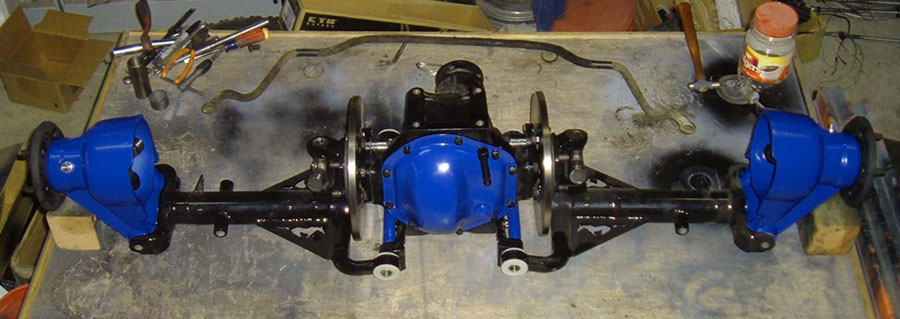 |
You are not logged in. Would you like to login?

![]() Offline
Offline
Trying to spec out a master cylinder for my project. Am running Mustang II eleven inch front discs and Jaguar center mount discs in rear and hope to run a manual master. Have read a lot of posts on the subject of master cylinder bore sizes for a manual application. The 1" bore seems to be the one that is most readily available. Is that best of should I go for 7/8"?
Last edited by jmbo (4/22/2012 11:38 am)
![]() Offline
Offline
Sorry - I've no direct answer - but, might check over with Grumpy;
A lot of discussion in that thread you might find useful.
Cheers - Jim
![]() Offline
Offline
A 1" would be better than a 7/8 just for the extra volume of fluid you might need to keep a decent pedal height/feel, Not sure of the stroke that is available to you , but make the best use of that ,that you can. The 7/8 might develope more line pressure but I don't beleive you will need it. On my current van I converted to 4 wheel manual disc and am happy with the 1" bore MC. 11" front rotors and11" rears with GM type calipers.
![]() Offline
Offline

jmbo,
I can check what I have when I get home. I have Grenada brakes on my MII front end. I can tell you I wish I had more pressure. My setup also includes Corvette C3 rears and a proportioning valve. I plan to do away with the PV because it somewhat wastes pedal energy. I will be going to a balance bar dual side by side master cylinders. I do have dual master cylinders now. Smaller is better as long as you have enough/minimal pedal motion. Someday I hope to afford a bigger aftermarket caliper rotor setup.
Ralphy
Last edited by Ralphy (4/23/2012 5:38 am)
![]() Offline
Offline
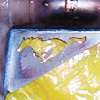
my question is how strong is your leg?? a smaller bore MC will produce less line pressure with less pedal effort and a bigger bore will produce more line pressure with more pedal effort. All things being equal (in other words going for the sam line pressure) a smaller bore MC will take less effort but more stroke to get the same stopping power as larger bore MC which will take less pedal stroke and and have a much harder pedal. I have granada disc on my Mustang and the stock Jag set upon the rear and am running a a manual 1" bore corvette Mc and it is a nice balanced breaking system.
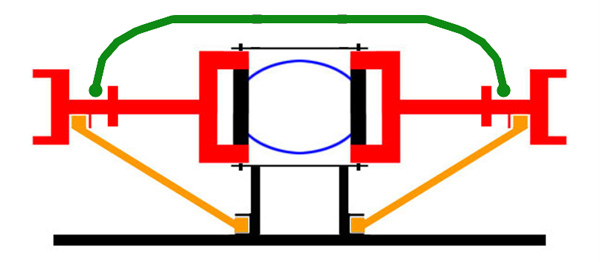
![]() Offline
Offline

A smaller bore MC will give a higher pressure and less volume. Increasing caliper bore also will give more braking. I have a friend on CC, he is going to a 3/4" bore with Wilwood three piston calipers. The rotors he will be using are 12 1/8", his wheels are 15". He already has the 3/4" MC's with no problems. I think I may also have a 3/4" with an app. 8" pedal length, travel is not an issue for me.
I did three laps at Las Vegas Motor Speedway last week doing a ride along. Going app. 160 mph on a 1 1/2 mile track. The cornering G's in the turns were just amazing and to think they race at a much higher speed. It felt like the rears should be breaking loose but boy oh boy, the cars really stick. And the straights seemed a lot shorter than I imagined.
Ralphy
Last edited by Ralphy (4/23/2012 5:43 am)
![]() Offline
Offline

Ralphy wrote:
A smaller bore MC will give a higher pressure
That is not exactly true. a smaller bore will provide higher line pressure for the same pedal effort as a bigger bore assuming there is enough stroke, but ultimately a bigger bore pushes more fluid with less stroke and given sufficient pedal pressure will produce higher line pressure. that is why power brakes produce higher line pressures because there is the extra boost adding to the pedal effort (basically) and the larger bore causes the system to firm up sooner and allowing more pressure as the pedal is pressed. In other words if you have a 1" bore MC and you depress the brake pedal 1" you will have more line pressure than if you used a 7/8" bore Mc and depressed the pedal that same 1"

![]() Offline
Offline

180 lbs. of leg force /6 to 1 pedal ratio/1 sq. in. master cyl. area = 1,080 psi
180 lbs. of leg force /6 to 1 pedal ratio/.75sq. in. master cyl. area = 1,440 psi
Equaling a 33% increase in psi.
What am I missing Day? The formula above shows a 360 pound increase in the smaller MC area. We are also not talking about a system with a power boost here. We are talking manual brakes. With a booster you can have the best of both. You can use a larger bore MC and use a larger boost assist. With manual brakes? You have your leg and that's it!
I just looked at what I have. Girling 3/4" bore MC's and I can say I have very little pedal travel. Plus the pedal is app. 8/1 ratio. My brakes are good, I just need to use a bit of leg force, I need to push hard not far.
Last edited by Ralphy (4/23/2012 6:47 pm)
![]() Offline
Offline

Ralphy wrote:
What am I missing Day?
stroke to stroke not leg pressure to leg pressure. What you have said , leg pressure to leg pressure, is correct but not exactly correct in that given a host of variables a larger bore will result in higher line pressure. That is exactly why power units use larger bores is you can produce higher line pressure for the same pedal stroke. More that the finer points of hydraulics I just want to make the point that going with a smaller bore MC will necessarily give you better stopping power.

![]() Offline
Offline
Ralphy is 100% correct on this one Daze.
Also.... The only reason the vehicles made today use as large master cylinder bore to wheel cylinder bore ratio is to reduce pedal travel. Modern systems will not produce acceptable stopping power with out a power booster to increase the pressure applied to the master cylinder. All the race cars I have worked on had no brake power booster due to poor engine vacuum and the rules do not allow brake vacuum pumps. They all used twin master cylinders with a balance bar to adjust the front to rear brake bias. This type of system provides equal or better pressure to the brake caliper as a boosted system. The twin master cylinder bores are not always the same size and if their piston areas were combined the sum will always be smaller than the piston area used on a boosted system with equal size caliper piston areas. The pedal travel would be excessive if two master cylinders were not used. The power generated by a power booster is not linear so brake pedal modulation on a boosted system is not as sensitive as a manual system. Power boosters for the most part were created so people with weak legs could stop, not for racing. This is a important point when you are braking at the limit of available traction. Power boosters make breaking traction at corner entry a more likely occurance.
Last edited by tyrellracing (4/24/2012 12:47 am)
![]() Offline
Offline
I vote with Ralphy on the math. But the variables on the complete system such as caliper piston area, knock back on the pads from slightly out of true rotors and the like would make me lean towards the larger bore MC, being a little more forgiving by moving more fluid in a given amount of stroke. From what I have researched ( a couple years ago now) the force at the pedal is usually designed around 80-100 lbs force. Once you start frankenstiening a brake system you have to account for the variables and if you are stuck with limitations on stroke ( like I was) you just have to choose a n MC bore that will do the job that you can also live with. I'm just thinking in terms of a street driven rig here. I leave the race applications to you guys !
![]() Offline
Offline

Day you keep saying line pressure. Are you referring to the pressure created by brake line restrictions when the fluid is moving from the MC to the wheel cylinders? Due to maybe too small of brake lines? This is what I would call a transitional period in which I would guess the larger MC abilities to push more fluid per second would excel. But again it's not braking force. Being more of the response time.
But I am again going to say, I have two 3/4" MC's, with the MII's front. I have no problems with excessive stroke or transition/response. I could use however more actual braking. The only way I can improve this is three ways, bigger rotors, more caliper piston area and or removing the restriction valve used on my rears and going with a balance bar. To give some perspective on how well a balance bar works. A good starting point is to set it at the get go 2/3 favoring the fronts. Right now my MC's are 50/50. Instead of just wasting energy with valving I can move and use my force to the front with a balance bar. This starting point would favor the front pressure 2/1instead of what I have 1/1. jmbo may or may not be able to go this route.
From real life experience I would say the rears add little braking force. I bought a car in which when I drove before I bought. The owner kept warning me be careful the rear will come around if you brake to hard. I was on semi-wet roads and testing the braking. The rear was getting twitchy, he was right. When I got the car home what did I discover? The reservoir was bone dry. So I added fluid, it ran right out of the RR caliper when I did brake. So I bought some C3 Wilwoods bled the brakes and backed of the valve. The rears locked up fairly easy! I had to crank down quit a bit on the valve, applying the brakes harder and harder trying to lock the rears. When all said and done what I saw was the rears for the most part keep the back in line tracking straight, being job one of the rear brakes. Yes they add stopping power but the fronts? That's where the action is!
I once owned a Yamaha XS1100 it had a big old rear rotor coupled with a looong lever! Boy talk about over kill, I had to feather the rear oh so lightly. I once went to Mid Ohio Road Course for the bike races. I saw these guys braking hard on a slight down hill. Rear wheel 4 to 6 inches off the ground! I think many of the more modern cars you see smaller calipers on the rear today.
Last edited by Ralphy (4/24/2012 7:49 am)
![]() Offline
Offline

Ralphy, Tyrell, You guys are totally missing my point ![]() and I think it because you are thinking that I am arguing the fact that
and I think it because you are thinking that I am arguing the fact that
By line pressure I am referring to the psi of the system when the brakes are applied.
180 lbs. of leg force /6 to 1 pedal ratio/1 sq. in. master cyl. area = 1,080 psi
180 lbs. of leg force /6 to 1 pedal ratio/.75sq. in. master cyl. area = 1,440 psi
Equaling a 33% increase in psi.
And I am NOT! ![]()
![]()
![]()
![]() That math is 100% correct IF AN ONLY IF there is sufficient stroke in the MC to compensate for the decrease in fluid volume, and there in lies the point I am trying to make. Based on your own example an extra .333" of stroke would be required on the smaller Mc to move the same volume of fluid as the bigger MC and if the 2 MCs only have 1.20" of stroke you come up .133" short of getting the fluid volume needed to get up to the desired psi
That math is 100% correct IF AN ONLY IF there is sufficient stroke in the MC to compensate for the decrease in fluid volume, and there in lies the point I am trying to make. Based on your own example an extra .333" of stroke would be required on the smaller Mc to move the same volume of fluid as the bigger MC and if the 2 MCs only have 1.20" of stroke you come up .133" short of getting the fluid volume needed to get up to the desired psi
The original statement
A smaller bore MC will give a higher pressure
Gives the impression, at least in my mind ![]() that regardless of application if a 1" bore MC produces X pressure a 3/4" bore will produce more and thus a 1/2" bore must produce even more than that. Even the math you posted gives that impression. The problem is that extra PSI comes at the price of reduced fluid volume and at some point you will have insufficient fluid to get increased pressure.
that regardless of application if a 1" bore MC produces X pressure a 3/4" bore will produce more and thus a 1/2" bore must produce even more than that. Even the math you posted gives that impression. The problem is that extra PSI comes at the price of reduced fluid volume and at some point you will have insufficient fluid to get increased pressure.
Example a .707" bore MC will push half the volume of fluid that a 1" bore MC will push for the same stroke. So if it takes 1" of stroke on a 1" bore MC to move enough fluid to get the brake system up to 1100 psi, It will take twice the stroke to move the same amount of fluid on a .707" bore MC to get to that same PSI (yes I totally agree that the pedal effort will be 1/2 as much). If both MCs only have 1.5" of stroke you will never get more line pressure out of the smaller bore MC (stroke to stroke) because it can not move enough fluid to get to the same pressure. With that said now reread what I originally said.
That is not exactly true. a smaller bore will provide higher line pressure for the same pedal effort as a bigger bore assuming there is enough stroke, but ultimately a bigger bore pushes more fluid with less stroke and given sufficient pedal pressure will produce higher line pressure. that is why power brakes produce higher line pressures because there is the extra boost adding to the pedal effort (basically turning your 180# of leg force to 250# or 300#) and the larger bore causes the system to firm up sooner and allowing more pressure as the pedal is pressed. In other words if you have a 1" bore MC and you depress the brake pedal 1" you will have more line pressure than if you used a 7/8" bore MC and depressed the pedal that same 1"
In other words given the same 4 calipers, AND you were able to apply enough leg pressure to push the pedal 1" with both MS regardless of leg effort the larger bore MC will ALWAYS produce more line pressure than the smaller bore MC for that same 1" (remember in this situation stroke is the same and the increased fluid volume of the larger bore MC is what is increasing the line pressure) Again that is why power systems use larger bore MC because more fluid volume = more pressure for the same stroke.

![]() Offline
Offline

Day that is why I have been asking to pinpoint your point. Then adding this bolded below in which I think your response has been. I'm responding in saying I do have the smaller MC's however I seem to have no issues, it's working for me. I do think your making a valid point in that regard.
"But I am again going to say, I have two 3/4" MC's, with the MII's front. I have no problems with excessive stroke or transition/response. I could use however more actual braking. "
Also I have mentioned line size. The line undersizing can come into play. With a smaller MC a larger line will reduce any lag while actuating your brakes. As also mentioned by I think Digz, untrue rotors can have an adverse effect causing more motion.
From reading at CC 3/4" MC's are used often with manual brakes. However I would think you as an owner would have to know these setups will be needed to be kept in top spec. Wear and age would more than likely cause higher pedal travel more rapidly. Mickmate and I are pretty much on the same page in regard to a manual setup for a Cobra. Now for others? They/ you may have another outcome. For one we have very short brake lines! LOL!
Further my point is, I have to push fairly hard already with a 3/4" MC. I don't even want to speculate replacing them with a 1" diameter. The CC member who is going with the bigger Wilwoods is Tom C.
Day this has been some great dialog greatly appreciated your points! ![]()
Ralphy
Last edited by Ralphy (4/24/2012 9:23 am)
![]() Offline
Offline
My little brother and I just got the brake system done on his GT2 car about a week ago. He purchased a complete willwood system with three masters that mount on the inside of the fire wall facing the driver and their resivours are remote mounted at the center of where the dash was so their volumes can be seen clearly from the drivers seat.. The third master is for the clutch. We plumbed in pressure gages for both front and rear, then bled both systems. With nowhere else to drive it, we took it out to the back ally's around his shop to get the balance bar set as close as possible by driving it. The balance bar is threaded and has a cable attached to one end with a knob mounted on the switch panel so the brake bias can be adjusted by turning the knob while driving. This is a cool set up! Both brake masters have 3/4 inch diameter bores. In the crampt area around the brake pedal I measured the pedal linkage and as best as I can tell it has a 8:1 ratio. With as close to exactly 100 lbs. pedal pressure as we could simulate with a bath room scale and a screw jack. We got 2800 psi front and 1950 psi rear. I am aware this doesnt seem to add up but it is what I observed. The car has 14x1.125 inch front and 12.5x1.125 rear vented and cross drilled rotors. The calipers are of the four piston variety with much larger fronts than rears but I did not get a chance to put a caliper on their pistons. This thing stops like you dropped an anchor with a small fraction of the 100 lbs pedal pressure we tested it at.
Last edited by tyrellracing (4/24/2012 5:33 pm)
![]() Offline
Offline
Those numbers are probably pretty close to true tyrell. The 1950 psi is just 100# over the static math and the 2800 psi would be equivilant to around 150# force. Gotta remember a .75 bore is actually only .442 sq inches.